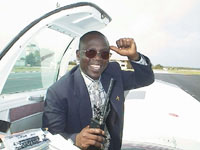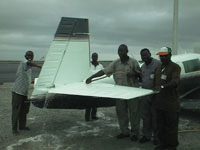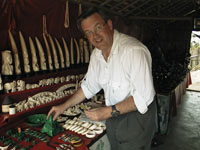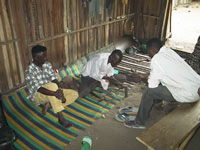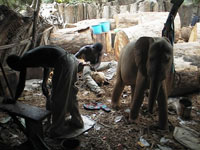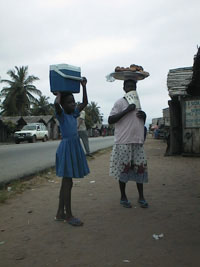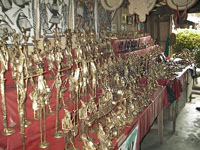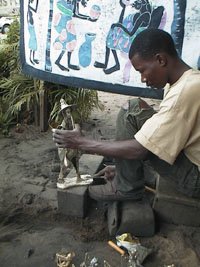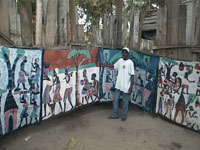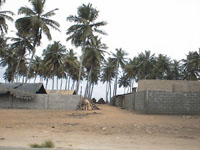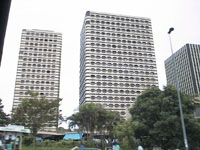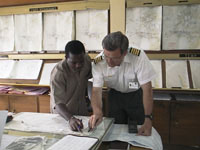![[image map, use itinerary]](/grphx/n_globe.gif) |
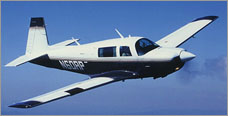 |
|
|
|
|
After my short but pleasant stay in Sao Tome, the next day, October 18th, I taxied out for a modest five hour flight to Abidjan. I had heard that this is a favorite "tech stop" for ferry pilots, with relatively cheap gas, and a fairly manageable bureaucracy. I arranged for a two night layover, as I also wanted to have the airplane washed, and that can easily be a half day project. The Mooney was covered with dust, and all the control surface crevices were still filled with desert sand after sitting outside in the blowing sands of Walvis Bay. Handling agent "Sunny" (his anglicized nickname) offered to arrange the washing for the second day of my stay, and true to his word, he picked me up at my hotel for the trip to the airport to oversee the project. What a mess! Sunny had arranged with an airport official to let us wash the plane out on the ramp using a nearby garden hose as a water source. He had also recruited some of the airport fueling staff to actually do the work. There were at least six of them, although none seemed to know much about the meaning of work. After a few minutes of watching them splash soapless water on the plane and pronouncing it "clean" (it was still filthy), Sunny and I realized that we'd just have to do it ourselves. We persuaded one of the workers to go get us some detergent, and we grabbed a couple of sponges and started scrubbing. An airplane has many times the surface area of a car, and half of that surface area is down low, under the wing and fuselage belly. The job is tedious, but there are folks at most airports who pride themselves on turning a dingy flying machine into a glistening, museum quality airplane for a few well earned bucks. These guys definitely did not belong in that group! In fact, after about five minutes of Sunny, his driver and myself scrubbing away, the group's supervisor came over and became quite agitated, shouting in nonstop French to Sunny, and then grabbing the hose away from him and angrily shutting it off. Apparently we were encroaching on the team's coveted three hour lunch siesta time, and he wanted us to stop and leave so he and his crew could go home. [People of all ages in the Ivory Coast go home to nap from 12 noon until 3pm, returning then to school or the office to complete the remaining two hours left in their working day.] Sunny argued with him for awhile, and after some more heated discussion in rapid fire French, the hose reappeared and we finished the job. The others never lifted a hand, except to light their cigarettes and gesture in laughter at our labors. The coup de Gras came when we then asked them to do what they're supposed to be trained to do, i.e., fuel the airplane. They were by now in a decidedly great hurry to finish up, and fuel was spilled everywhere and the paint on one of my wings badly scratched as they crudely manhandled the heavy fuel dispensing spout around the plane, recklessly banging metal on metal. I was frustrated, but that frustration only got worse later in the afternoon when Sunny announced that his bill for handling my flight, transporting me to and from the hotel, and getting the airplane washed would be $1,500. And he would only accept it in cash! Realizing that he and his aircraft handling company were so well connected with the government officials at the airport that not paying him could be tantamount to me deciding on permanent Ivory Coast residency, I bit my lip and negotiated the rate down to a merely outrageous $1,200. Yes, Sunny did take me on a very pleasant two hour tour of the city earlier that afternoon, and yes, he did slide me through all the airport red tape with the speed of a hot knife cutting through butter, but this was simply Third World extortion! I had been charged large fees like this in India also, but in that case I had been forewarned by a number of sources to expect it, so I did. Here it really came as an unpleasant surprise.
Next Stop: Sal, Cape Verde Islands Designed by MindSpring
|
